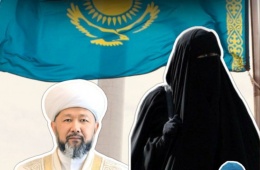Добавить комментарий
Gulnaz Razdykova : We have reached remission just of extremism on the special operation «Jusan», and it is too early to sum up the results
 1935
1935 
I interviewed Gulnaz Razdykova, the Head of «the Center for analysis and development of interfaith relations» about what changes have occurred in the minds of women returned from the war zone in Syria during the operation «Jusan» and if they have refused from a radical ideology.
- Gulnaz Maksutovna, you are working as a psychologist with «Jusan» women closely. How do you assess their conditions now?
-To date, we have achieved only the remission of radicalism, that is, women in terms of disincentives have abandoned only extremely radical things, assessments of some specific events, such as the causes of the war in the Middle East or such concepts as jihad, darul-kufr, takfir, kafir, tagut, etc. They mostly agree that it was wrong to go there, but at the same time many of them remain on the same basic principles of their radical ideology.
-Can we say that the women are completely deradicalized today and do not pose a danger to society?
-It is too early to talk about the results, because the work on the rehabilitation of these women is still ongoing. We are as psychologists; so far we cannot talk about full rehabilitation, because in any case there has already been a traumatic impact on their consciousness and psyche. All these women have experienced a shock Psycho trauma, that can just fade in their minds, but reminds of itself. Working as a psychologist with young women in Aktau I have told them that the memories of Syria should be blurred, discolored in their memory. But that experience must not be forgotten in any way, because they must learn from it.
-Tell us about the reasons for women's departure to Syria.
Mostly, people left for their dreams to live in the caliphate, and this idea became a destructive meaning of their life.
-The very phenomenon of ISIS is that it is a franchise that has skillfully speculated on social problems, emotional vulnerability, religious illiteracy, and personal problems of extremists. The mechanisms of psychological infection of those women were much more effective. The women who have gone to the territory of hostilities can be etymologized conditionally into four groups. The first group are women who went to Syria for their husbands. The second category is women who left of their own free will, with children, etc. The third category is women who were already in the Middle East at the time of the war. They just joined the terrorists. The fourth small category is generally non-religious women. Surprisingly, there are women who have started their religious practices already in Syria.
-Are there any successful cases of their reintegration?
It is important to understand that, despite being painful, symptoms can make positive changes to an individual’s area of social roles. As noted above, some women have a positive adaptation to trauma, using their experience as a source of motivation. For example, a young woman from Atyrau wrote a book and began to carry out an active public work. Some of them have become outreach workers, they are actively involved in TV shows to deradicalizate other women, and prevention of religious extremism and terrorism. Some of the young women won competitions to receive grants to open business projects.
-Which women are the most difficult to rehabilitate?
- Most of all, we care, of course, about working with women who are prone to self-radicalization.
My experience with women confirms they have all the signs of post-traumatic syndrome.
-Are there any dangerous but charismatic preachers among the returned women who can recruit Kazakhs to ISIS?
-I have never seen or met such charismatic women leaders. Personally, I have not worked with them, but I think that there are some women among them who were engaged in active recruitment. To date, eight women are already serving sentences for their activities in Syria. Now there is a period of remission, but in order to achieve a lasting effect, you need, first, time, and secondly, the efforts of specialists in the field. And not only psychologists, theologians, but all communities should work in the area.
-How do these women feel now, what do they tell you, their sisters of faith?
-Many women are still grateful for being able to return home. They are happy that they now walk on their native land. They are glad that their relatives and their children are completely safe. Now they realize that they have made a mistake. They are grateful to the state and our society, which creates all conditions for them to work, to train their children and so on. Speaking on television, the young women warn the other sisters against their mistakes, tell them that ISIS is built on deception, the blood of innocent people. Reckoning for their mistakes was terrible, they survived the loss of their husband, girlfriends and even the death of their children. But you and I must be more tolerant of them and their children support and extend a helping hand to them. I really hope that the return of the women from the war zone will be a lesson for other ones dreaming of leaving for the pseudo-caliphate state.









